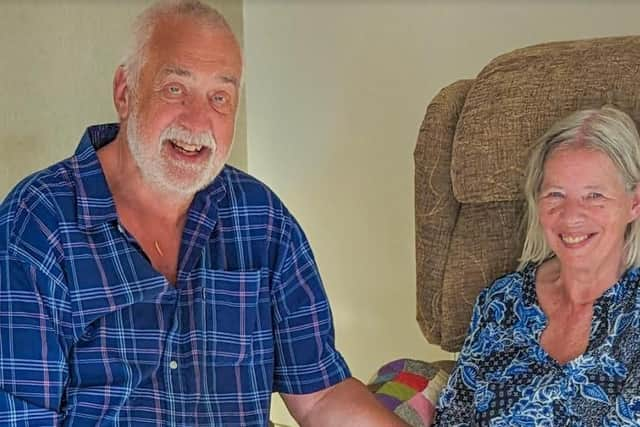How Wakefield charity Aphasia Support is helping Ossett woman regain her communication after a stroke
and live on Freeview channel 276
With a family history of stroke and high blood pressure, Susan , a former teacher from Ossett, was always aware of the hereditary risk she faced.
Sadly, in August 2020, Sue’s concerns became a reality.
Her husband of over 40-years, Bob, said: “Sue had gone to bed complaining of a headache, fatigue, and dizziness.
Advertisement
Hide AdAdvertisement
Hide Ad

"A few hours later, I found her on the bed totally unresponsive. I called an ambulance, and the first responders were superb.
"Sue was taken to Hull Royal Infirmary where scans showed that she had suffered two major bleeds on the brain. We were told to expect the worst.”
The stroke had left Sue with no function in her right-hand side, and her speech had been impacted heavily. She was transferred from Hull to Scarborough hospital, where it was explained that her condition would be ‘life changing’.
“Doctors had me that Sue was unlikely to walk and talk again,” Bob said.
Advertisement
Hide AdAdvertisement
Hide Ad"The prognosis was bad. Sue received some physio and speech therapy in hospital but again we were told to expect little progress due to the severity of her strokes.”
Four months later, Sue was discharged and returned home.
She continued to receive physio and speech therapy in the community, which Bob describes as ‘amazing’.
Determined to outperform the doctor’s cautionary prognosis, Sue’s family and friends rallied round and her daughter Emma, a physical therapist, created an exercise regime for Sue to follow.
From a physical point of view, Sue’s mobility has significantly improved thanks to her determination.
Advertisement
Hide AdAdvertisement
Hide AdShe does bed exercises and ‘walks’ every day, and Emma treats her knee, ankle, and shoulder with laser therapy on a regular basis. Sue now enjoys trips to the garden centre, sculpture park, theatre, and local cafes in her wheelchair.
Bob and Sue were also working hard on Sue’s speech.
“A friend who runs an Alzheimer’s choir told us to try singing. Another told us to use simple poetry. We did – morning, noon and night in the hope that Sue’s words will return.
“We also have a very supportive group of friends and neighbours who visit regularly and talk with Sue not to her. Everyone has high expectations of Sue and have been so supportive. No one has ever talked down to her.”
However, Sue wanted to develop her communication further.
“Sue had become bored with her limited speech, but luckily, Aphasia Support came along at just the right time.” Bob said.
Advertisement
Hide AdAdvertisement
Hide AdAn Aphasia Support speech and language therapist, Gemma Hoyle, visited Sue and assessed her communication skills. Sue had acquired expressive aphasia following her stroke, which had impacted her speech, but she also had difficultly reading.
She began one-to-one support with a volunteer, Sarah, with the aim of improving her understanding, communication, and general wellbeing.
“Sue was given her own ipad and introduced to several communication apps. Suddenly she was able to choose when and how long she worked on her language and understanding. She was in charge. It worked so well.
“Sarah was brilliant. As well as making progress with the apps, they spent a lot of time ‘chatting’. It gave Sue another voice and it was lovely to hear them together.”
Advertisement
Hide AdAdvertisement
Hide AdAll of Sue’s hard work came to a head one day, when she was watching the news and managed to ask Bob a question. Phrases are coming back to Susan, and she is now also able to read some words.
“Aphasia Support has made a huge difference. Sue now has a high level of independence, which we never dreamed of having initially. Her self-confidence, although fragile at times, has soared.
“Although she was making progress before, she couldn’t measure it. The programme from Aphasia Support allows Sue to see her, hear and feel her amazing progress.
"The team have played a huge role in Sue’s rehab. They have helped build her self-reliance, autonomy, and optimism.
"Quite simply, she wouldn’t be where she is today without them.”
To find out more about Aphasia Support click here.